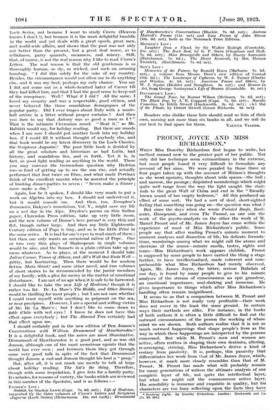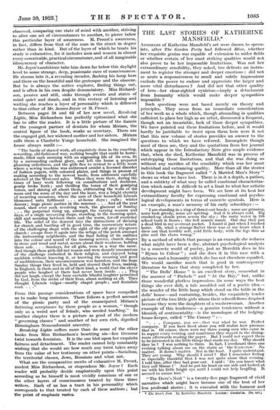PROUST, JOYCE AND MISS RICHARDSON.*
WHEN Miss Dorothy Richardson first began to write, her method seemed new to the greater part of her public. Not only did her technique seem extraordinary in the extreme, but most people found it very difficult to formulate any account of her aims. We were puzzled by those three or four pages taken up with the account of Miriam's thoughts as she went upstairs, thoughts about wide spaces—the hall ; and narrow, the passage ; disjointed meanderings which might quite well range from the way the light caught the stair- rods to the great Wall of China and end in the " friendly brown sound of her empty bedroom." All this produced an effect of some sort. We had a sort of deaf, short-sighted feeling that something was going on—the question was what ?
But since the days when she wrote Pointed Roofs, Back- water, Honeycomb, and even The Tunnel, on one side the work of the psycho-analysts on the other the work of M. Marcel Proust and of Mr. James Joyce has come within the experience of most of Miss Richardson's public. Some people say that after reading Proust's minute moment to moment analyses and dissection of life, his delicate formula- tions, wanderings among what we might call the atoms and electrons of the senses—minute smells, tastes, sights and tones—Miss Richardson's work appears childish. Proust is supposed by some people to have carried the thing a stage further, to have intellectualized, made coherent and com- prehensible what Miss Richardson had merely observed. Again, Mr. James Joyce, the bitter, serious Rabelais of our day, is found by many people to give to his minute analyses of the stream of consciousness an epic grandeur, an emotional importance, soul-shaking and immense. He gives importance to things which after Miss Richardson's handling often remain insignificant.
It seems to us that a comparison between M. Proust and Miss Richardson is not really very profitable—their work does not cover in the least the same ground. In certain ways their methods are alike. For instance, in the books of both authors it is often a little difficult to find out the outward circumstances of the person the working of whose mind we are shown. Both authors realize that it is not so much outward happenings that shape people's lives as the way in which these happenings are interpreted by the persons concerned. But while M. Proust's men and women are active, often restless in shaping their own destinies, altering, re-arranging, striving, Miss Richardson's derive a kind of ecstasy from passivity. It is, perhaps, this passivity that differentiates her work from that of Mr. James Joyce, which, however, it much more closely resembles than that of M. Proust. M. Proust has made what will probably remain for many generations of writers the ultimate analysis of one complete layer of life, not quite the' intellectual layer, but what we might call the commonsense active layer. His sensibility is immense and exquisite in quality, but his characters are too busy reflecting upon the facts they have • Revolving Lights. By Dorothy Richardson. London : Duckworth and Co. 17s. ed. net.)
observed, comparing one state of mind with another, striving to alter one set of circumstances to another, to pierce below this particular layer of awareness. M. Proust's awareness, in fact, differs from that of the man in the street in degree
rather than in kind. But of the layer of which he treats his study is exhaustive, for it includes men and women in almost
every conceivable, practical circumstance, and of all imaginable idiosyncrasy of character.
Mr. Joyce's ambitions take him down far below this daylight level to some strange, deep, passionate cave of consciousness. He storms into it, a revealing invader, flashing his lamp here and there on the beautiful and the grotesque and the obscene. But he is always the active explorer, finding things out, and is often in his own despite denunciatory. Miss Richard- son, passive and still, sinks through events and states of mind quiet and dumb, and in this ecstasy of listening and waiting she reaches a layer of personality which is different to that either of Mr. James Joyce or M. Proust.
Between pages 58 and 63 of her new novel, Revolving Lights, Miss Richardson has perfectly epitomized what she has to offer the reader. It is a little picture of the fiancée of the youngest partner of dentists for whom Miriam, the central figure of the book, works as secretary. There are the engaged girl, her widowed mother and her sisters. Miriam calls them a Charlotte Yonge household. She imagined the house always sunlit :—
" The bustle of shared work, all exquisitely done in the exacting, rewarding, old-fashioned way, nothing bought that could be home- made, filled each morning with an engrossing life of its own, lit by a surrounding endless glory, and left the house a prepared gleaming orderliness, and the girls free to retreat to a little room where a sewing machine was enthroned amidst a licensed disorder of fashion papers, with coloured plates, and things in process of making according to the newest mode, from oddments carefully selected at the West-end sales. When they were there, during the times of busy work following on consultations and decisions, gossip broke forth ; and thrilling the tones of their gossiping voices, and shining all about them, obliterating the walls of the room and the sense of the day and the hour, was a bright eternity of recurring occasions, where the sum of their household labours blossomed unto fulfilment . . . at-home days ; calls ; winter dances ; huge picnic parties in the summer. . . . And all the year round, shed over each revolving week, the glamour of Sunday . . the perpetual rising up, amongst the varying seasons and days, of a single unvarying shape, standing, in the morning quiet, chill and accusing between them and the warm, far-off everyday life._ The relief of the descent into the distractions of dressing for church and bustling off in good time, the momentary return of the challenging shape with the sight of the old grey ivy-grown church ; escape from it again into the refuge of the porch amongst the instreaming neighbours, and the final fading of its outlines into the colour and sound of the morning service, church shapes in stone and wood and metal, secure about their weakness, holding them safe. . . . Sundays, for all girls, were in a way the mine. And though these girls did not reason and were densely unconscious of the challenge embodied in their religion, and enjoyed being snobbish without knowing it, or knowing the meaning and good of snobbishness, their unconsciousness was harmless, and the huge Sunday things they lived in, held and steered their lives, making, in England, in them and in all of their kind, a world that the clever people who laughed at them had never been inside. . . . They did not laugh, except the busy enviable blissful laughter permitted by God, from the midst of their lives, about nothing at all. They thought Liberals vulgar—mostly chapel people ; and Socialists mad. . . ."
From this passage considerations of space have compelled us to make long omissions. There follows a perfect account of the picnic party and of the emancipated Miriam's flattering acceptance by these people as a woman, " though only as a weird sort of fethale, who needed teaching." In another chapter there is a picture as good of the modern " governing classes " and another of her own rich, dignified
Birmingham Nonconformist ancestry. Revolving Lights suffers more than do some of the other books from Miss Riehardson's besetting sin—her tiresome twist towards feminism. It is the one blot upon her exquisite fairness and detachment. The reader cannot help constantly wishing that she would see how much any twist takes away from the value of her testimony on other points—Socialism, the territorial classes, Jews, Russians and what not.
What are the comparative merits of exhaustive M. Proust, modest Miss Richardson, or stupendous Mr. Joyce ? Each reader will probably decide emphatically upon this point according as he himself is most vividly conscious of one or the other layers of consciousness treated by these three writers. Each of us has a tract in his personality which corresponds to that treated by each of these authors ; but the point of emphasis varies.











































 Previous page
Previous page